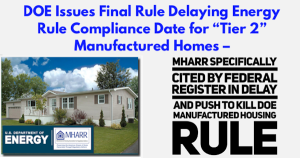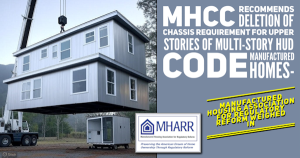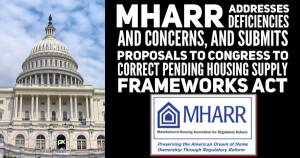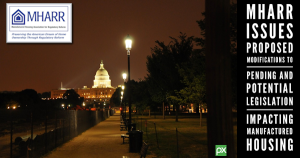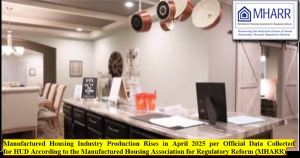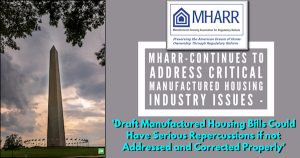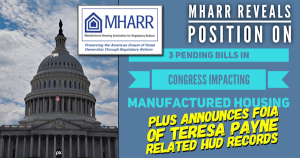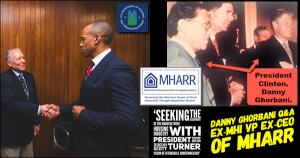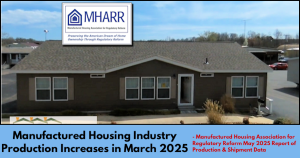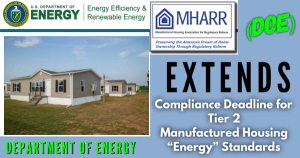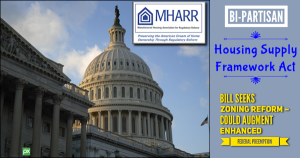With HUD Regulators Stalling MHARR Presses Critical Manufactured Home Issues Up The Ladder
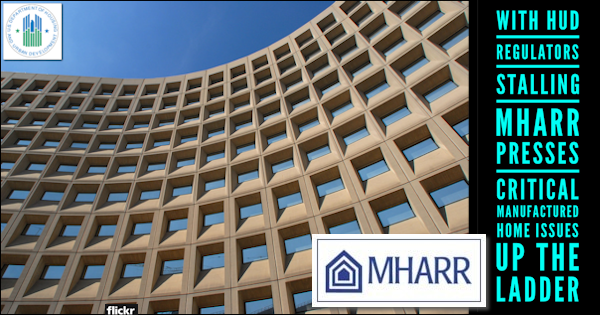
Washington, D.C., July 15, 2020 – In a Petition for Rulemaking to Secretary Carson and other senior HUD officials copy attached, the Manufactured Housing Association for Regulatory Reform (MHARR) breaks wide open the lack of any meaningful progress to date toward regulatory reform – as mandated by President Trump – within the HUD manufactured housing program.
With program regulators stalling progress on multiple regulatory reform proposals submitted in response to a supposed “top-to-bottom” review of federal manufactured housing standards, enforcement regulations and other pseudo-regulatory mandates — and with just six months remaining in President Trump’s current term — MHARR’s Petition goes to the heart of lawless program policies that have allowed the Department to engage in abusive regulatory practices in direct violation of Trump Administration Executive Orders and related regulatory policies, and the 2000 reform law itself.
In particular, MHARR’s Petition addresses HUD’s use of “guidance” documents and similar sub-regulatory mandates, issued without prior Manufactured Housing Consensus Committee (MHCC) review or notice and comment rulemaking – as required by applicable law – to impose new regulatory burdens and additional regulatory compliance costs on both HUD Code manufacturers and consumers. In seeking the adoption of rulemaking requirements for such “guidance” in accordance with Trump Administration Executive Order (EO) 13891, MHARR also seeks the withdrawal of a 2010 HUD “Interpretive Rule” which effectively gutted section 604 (b)(6) of the Manufactured Housing Improvement Act of 2000.
That provision, which, as written, requires any HUD statement of policy or practices regarding either the federal standards or their enforcement – including so-called “guidance” — to be brought to the MHCC for prior review and then published in the Federal Register for notice and comment, was designed by Congress and included in the 2000 reform law precisely to stop regulators and entrenched program contractors from using sub-regulatory “guidance” – typically formulated behind closed doors – to impose costly new requirements on producers. This abusive practice had become widespread within the HUD program prior to the 2000 law and, with HUD’s effort to negate section 604 (b)(6), remains a major issue today. Unwilling to live with section 604 (b)(6)’s express directive, however, and unwilling to give up its unlawful reliance on sub-regulatory “guidance,” HUD’s so-called “Interpretive Rule,” effectively striped that section out of the law, with absolutely no legitimate basis whatsoever, as shown by EO 13891.
MHARR’s Petition, accordingly, seeks to restore section 604 (b)(6) to its original meaning – as written by Congress – to protect manufacturers and consumers from the imposition of basis and needlessly costly regulatory mandates in violation of its consensus review and rulemaking requirements. And while the original effort to negate section 604 (b)(6) as written can be attributed to HUD regulators and contractors trying to cut corners to deliver lucrative new “duties” to those contractors with absolutely no basis in law, the resulting abuses have been perpetuated with the aid and assistance of the usual “go-along” segment of the industry, which has baselessly opposed prior MHARR reform efforts. MHARR’s Petition seeks to end this gamesmanship by requiring specific regulations for “guidance” documents consistent with section 604 (b)(6) of the 2000 reform law and EO 13891.
In Washington, D.C., MHARR President and CEO, Mark Weiss, stated: “President Trump’s EO 13891 makes it abundantly clear that section 604(b)(6) of the 2000 reform law means exactly what it says as written. It is long past time to restore this key protection in order to ensure that baseless new regulatory compliance costs are not imposed on manufacturers and consumers through the backdoor, while the procedures required by law are willfully ignored.”
The Manufactured Housing Association for Regulatory Reform is a Washington, D.C.-based national trade association representing the views and interests of independent producers of federally-regulated manufactured housing.
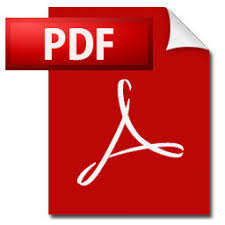
Washington, D.C., July 15, 2020 – In a Petition for Rulemaking to Secretary Carson and other senior HUD officials (copy attached), the Manufactured Housing Association for Regulatory Reform (MHARR) breaks wide open the lack of any meaningful progress to date toward regulatory reform – as mandated by President Trump – within the HUD manufactured housing program.
With program regulators stalling progress on multiple regulatory reform proposals submitted in response to a supposed “top-to-bottom” review of federal manufactured housing standards, enforcement regulations and other pseudo-regulatory mandates — and with just six months remaining in President Trump’s current term — MHARR’s Petition goes to the heart of lawless program policies that have allowed the Department to engage in abusive regulatory practices in direct violation of Trump Administration Executive Orders and related regulatory policies, and the 2000 reform law itself.
In particular, MHARR’s Petition addresses HUD’s use of “guidance” documents and similar sub-regulatory mandates, issued without prior Manufactured Housing Consensus Committee (MHCC) review or notice and comment rulemaking – as required by applicable law – to impose new regulatory burdens and additional regulatory compliance costs on both HUD Code manufacturers and consumers. In seeking the adoption of rulemaking requirements for such “guidance” in accordance with Trump Administration Executive Order (EO) 13891, MHARR also seeks the withdrawal of a 2010 HUD “Interpretive Rule” which effectively gutted section 604 (b)(6) of the Manufactured Housing Improvement Act of 2000.
That provision, which, as written, requires any HUD statement of policy or practices regarding either the federal standards or their enforcement – including so-called “guidance” — to be brought to the MHCC for prior review and then published in the Federal Register for notice and comment, was designed by Congress and included in the 2000 reform law precisely to stop regulators and entrenched program contractors from using sub-regulatory “guidance” – typically formulated behind closed doors – to impose costly new requirements on producers. This abusive practice had become widespread within the HUD program prior to the 2000 law and, with HUD’s effort to negate section 604 (b)(6), remains a major issue today. Unwilling to live with section 604 (b)(6)’s express directive, however, and unwilling to give up its unlawful reliance on sub-regulatory “guidance,” HUD’s so-called “Interpretive Rule,” effectively striped that section out of the law, with absolutely no legitimate basis whatsoever, as shown by EO 13891.
MHARR’s Petition, accordingly, seeks to restore section 604 (b)(6) to its original meaning – as written by Congress – to protect manufacturers and consumers from the imposition of basis and needlessly costly regulatory mandates in violation of its consensus review and rulemaking requirements. And while the original effort to negate section 604 (b)(6) as written can be attributed to HUD regulators and contractors trying to cut corners to deliver lucrative new “duties” to those contractors with absolutely no basis in law, the resulting abuses have been perpetuated with the aid and assistance of the usual “go-along” segment of the industry, which has baselessly opposed prior MHARR reform efforts. MHARR’s Petition seeks to end this gamesmanship by requiring specific regulations for “guidance” documents consistent with section 604 (b)(6) of the 2000 reform law and EO 13891.
In Washington, D.C., MHARR President and CEO, Mark Weiss, stated: “President Trump’s EO 13891 makes it abundantly clear that section 604(b)(6) of the 2000 reform law means exactly what it says as written. It is long past time to restore this key protection in order to ensure that baseless new regulatory compliance costs are not imposed on manufacturers and consumers through the backdoor, while the procedures required by law are willfully ignored.”
The Manufactured Housing Association for Regulatory Reform is a Washington, D.C.-based national trade association representing the views and interests of independent producers of federally-regulated manufactured housing.



